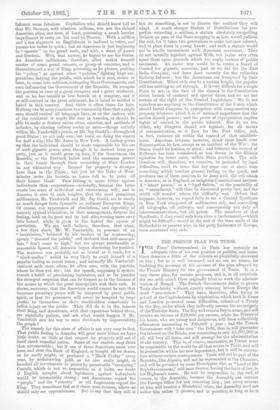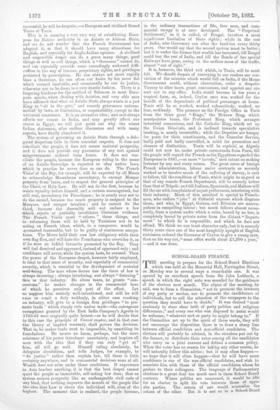Tlir FRENCH PLAN FOR TUNIS. T HE Times' Correspondent in Paris
has certainly an adequate idea of his own position in politics, and some- times deserves a little of the ridicule so plentifully showered on him ; but he is well informed, and we see no reason for doubting the accuracy of his account of the plan ,adopted by the French Ministry for the government of Tunis. It is a very clever plan, for certain purposes, and is, in all essentials, the one with which Clive originally tried to work the adminis- tration of Bengal. The French Government desire to govern Tunis absolutely, without exactly uttering before Europe the word "annexation." They have, therefore, after trying to get rid of the Capitulations by negotiation, which both in Rome and London presented some difficulties, submitted a Treaty to the Bey, under which they indirectly assume the sovereignty of the Tunisian State. The Bey will remain Bey in name, and will receive an income of £28,000 per annum, while the Princes of his house, who are young and dangerous, will draw collectively allowances amounting to £40,000 a year ; but the French Government will "take over" the Debt, that is, will guarantee the interest on the Bonds, now amounting to only .5,000,000 in all, will levy all taxes, and will arrange for the adrmmetration of the country. This is, of course, annexation, as France must be responsible to the world for all that occurs in Tunis, and will be jrresistible within her new dependency,.but it will be annexa- tion without certain consequences. Tunis will not be part of the Republic, like Algeria, will not be represented in the Chamber, and will be governed by some Frenchman who, as "head of the Boy's Government," will issue decrees, having the force of law, in his Highness's name. He will be responsible in the end, of course, to the Assembly, because the Assembly can censure the' Foreign Office for not removing him ; but every censure on him will involve a Ministerial crisis, the Assembly need not notice him unless it pleases, and in practice, so long as he is
suotessftil, he will be despotic,—a European and civilised Grand Vizier of Tunis.
This is in seeming a very easy way of substituting Euro- pean for Native authority in an Asiatic or African State, and we do not wonder that the French' Government has adopted it, or that it should have many attractions for English, and especially for Anglo-Indian opinion. A civilised and responsible despot can do a great many things, good things as well as evil things, which a " Governor " cannot do, and can especially override some exceedingly awkward diffi- culties in the way of tenures, proprietary rights, and privileges protected by prescription. He can always act more rapidly than a Governor, he can often cut knots by his mere fiat which seemed insoluble, and occasionally he can •do justice, otherwise not to be done, in a very drastic fashion. There is a lingering 'kindness for the method of Solomon in most Euro- petin minds, when dealing with Asiatics, and very able men have affirmed that what an Asiatic State always wants is a just King to "sit in the gate," and remedy grievances untram- melled by laws, or limitations, or responsibility, except to the universal conscience. It is an attractive idea; and as it always affects our course in India, and may greatly affect our course in Egypt, we will just point out why the wisest Indian statesmen, after endless discussion and with many regrets, have finally abandoned it.
The system of governing an Asiatic State through a dele- gated despotism fails in three essential respects. It does not conciliate the people, it does not secure material prosperity, and it does not provide any guarantee of any sort against
misgovernment ordered from home. It does not con- ciliate the people, because the European ruling in the name of an Asiatic Sovereign is expected, to obey native laws, which'. in practice he never does or can do. The French Vizie of the Bey, for example, will be expected by all Moors to acknowledge Mussulman ascendancy, to exempt Mosque preperty from taxes, and to respect the general principles of the Cheri, or Holy Law. He will not do the first, because he wiinta- equality before himself, and a certain unrecognised, but still real, ascendancy for Frenchmen ; he is nearly sure not to do the second, because too much property is. assigned to the Mosques, and escapes taxation ; and he cannot do the third, because the Assembly will not endure a law -which rejects or partially invalidates Christian evidence. The French Vizier must " reform " these things, and in reforming them will be held by Tunisians not to be acting on French ideas, which, in a conqueror, would be accounted reasonable, but to be guilty of continuous usurpa- tions. The Moors held their own law obligatory while their own flag flies, and will hate the Frenchman who overrides it, as if he were an Infidel favourite promoted by the Bey. They will feel deceived and oppressed, instead of oppressed only ; and cenfidence will never, while the system lasts, be aroused. Then the power, of the European despot, however fairly employed, is fatal to that sense of security, and especially of commercial security,, which. is essential to the development of material wellsbeing. The man whose decree has the force of law is always decreeing ; always interfering, and always " fostering " this .or that industry. He alters taxes, he grants "con- cessions," he makes changes in the commercial laws .of which he perceives only part of the effect. Let us suppose him entirely well-intentioned, and still he will raise or remit a duty suddenly, in either case crushing an industry, will give to a foreign firm privileges "to pro- mote trade" which simply ruin native trade—the outrageous exemptions granted by the East India Company's Agents in 17G0-64 were originally quite honest—or he will decide that in this case the principle of Caveat emptor, and in that case the theory of implied warranty, shall govern the decision. That is, he makes trade next to impossible, by unsettling its foundations. He means no harm, perhaps, but the mere existence of his power introduces uncertainty, and inspires all men With the idea that if they can only "get, at"
Lim, all will go well. Himself ruling absolutely, he delegates absolutism, and tells Judges, for example to "do justice" rather than explain law, till there is little certainty anywhere, and in commercial decisions none at all. Wealth does not arise under those conditions. If experience in Asia teaches anything, it is that the best despot cannot quiet the people as immutable, self-acting law does ; that no system secures prosperity like an unchangeable civil code of any kind, that nothing improves the morale of the people like the idea that Law is above the individual will, even of the highest. The moment that is realised, the people become, in the ordinary transactions of life, free men, and com- mercial energy is at once developed. The "Perpetual Settlement," as it is called, of Bengal, involves a most injudicious limitation of State rights ; while in the rest of India, wise Governors can alter the land-tax every thirty years. One would say that the second system must be better ; but it is under the former that wealth has increased, till Bengal could buy the rest of India, and till the Bonds of her special Railways have gone, owing to the endless mass of the traffic, almost " out of sight."
It is, however, the third evil which, in Tunis, will be most felt. We should despair of conveying to our readers our con- viction of the miseries which would fall on India, if the Home Government could, without observation, order a despotic Viceroy to alter taxes, grant concessions, and appoint any one sent out to any office. India would become in ten years a tropical farm, as, indeed, Ceylon once was, worked for the benefit of the dependents of political personages at home. Tunis will be so woiked, worked exhaustively, worked, we fear, recklessly. The pressure on the Foreign Office in Paris from the three great " Rings," the Hebrew Ring, which manipulates loans, the Protestant Ring, which arranges industrial concessions, and the Catholic Ring, which set up the Union Gdndrale, and is inclined towards speculative banking, is nearly irresistible ; while the Deputies are hungry for posts for their constituents, and the Consular Service, badly paid and badly controlled, is rabid for promotion and
chances of distinction. Tunis will be exploitd, as Algeria could not now be, under private memoranda from Paris, till the people will regard the French as the Egyptians regarded the Europeans in 1881,—as mere "locusts," men intent on making fortunes by any and every means. The great curse of foreign French administration, labour under contracts so severely worked as to involve much of the suffering of slavery, is sure to follow, till the condition of Tunis, which might be as good as that of any remote French Department, will be scarcely better than that of Tripoli; and till Italians, Spaniards, and Maltese will fill the air with complaints of unjust preferences, interfering with their industry. Much of this mischief is special to French- men, who endure " jobs " at Colonial expense which disgrace them, and who, in Egypt, Guiana, and Rdunion are unscru- pulous in compelling labour ; but much follows almost neces- sarily, from a system under which a ruler, bound by no law, is completely bound by private notes from the distant "Depart- ment" to which he is responsible, and which he dare not offend. We think we can trust character only, but it is scarcely thirty years since one of the most haughtily upright of English statesmen ordered the Governor of Ceylon to give a young man, then on his way out," some office worth about 21,200 a year," —and it was done.



































 Previous page
Previous page